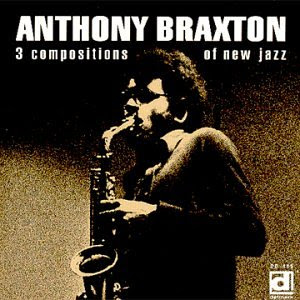Showing posts with label Avant Garde Jazz. Show all posts
Showing posts with label Avant Garde Jazz. Show all posts
Thursday, January 29, 2015
Eric Dolphy - At The Five Spot (1961)
The charm of live jazz albums are made or broken by the recording quality. Take Coltrane's Impressions for example, a fantastic quartet session cut down because of a severely undermic'd McCoy Tyner. Horace Silver's date at the Village Gate or any of the live Jazz Messengers albums, on the other hand, are great on record since the roaring crowd and fun announcements fit the brisk and bouncing hard bop they play.
Dolphy's Five Spot recordings are probably the coolest that I've heard. There are no announcements, just a few seconds of downtime and warmup before the lengthy pieces begin. The horns are super clear (which you'd want for a combo like Dolphy and Little) but none of the rhythm section's integrity is lost. Is it only the recording that makes this album so great? Hell no, just a factor that pushes this date to be one of my favorites ever.
Dolphy and his group aren't doing anything too groundbreaking in terms of the avant-garde he was committed to more and more every year. The quintet plays on a number of bop rhythms, and Dolphy shows he can be fire on this type of stuff as well as his strange cello duos. Booker Little is like the second coming of Clifford Brown: that speed! that melody! that stamina! Holy shit this guy is fire! I wonder how much different Out To Lunch would have been with him instead of Freddie Hubbard. The rhythm section is badass as well. Mal Waldron is an interesting pianist that was one of the founding fathers of the post-bop concept. While this elder was born in the hard bop era, he was messing around with different sounding melodies in the late 50s and was ready to hop on board with Dolphy, Little, and Ervin as soon as they pounced on the scene. Need I say anything about Richard Davis? Let's let his resume speak for itself. His later techniques might be downplayed here, but it's still him and he's a presence you'll certainly feel. Eddie Blackwell is just what these guys needed since he was just a part of Ornette's free-bop stuff with Atlantic. That's the lineup, the tracks are some of Dolphy and Little's best to fly on; just let the music speak for itself.
Volume 1, Volume 2, and Memorial Album
Labels:
1960s,
Avant Garde Jazz,
booker little,
eric dolphy,
hard bop,
jazz,
mal waldron,
post bop,
richard davis
Wednesday, December 3, 2014
Sam Rivers - Streams (1973)
Sam Rivers was more hesitant than the rest of the first wave free jazz saxophonists to completely cut his playing from any constraints. Fuchsia Swing Song and Contours are somewhat progressive jazz albums still heavily rooted in blues and black roots, but Streams is a total let go from any sense of that. I'm usually not a huge fan of free jazz when it headed into the 70s and beyond, but this is an exception. The small band approach to this wild stuff is refreshing seeing that 10+ piece bands were taking over the avant garde jazz scene at this time. Rivers is backed by one of my all time favorite bassists, Cecil McBee, whose originality and angular nimbleness on the instrument always hooks me. I can't say I'm as familiar with Norman Connors (I've only heard him on a couple of Pharoah Sanders albums), but that doesn't mean he isn't killing it all the way through. Rivers plays his three primary instruments (tenor and soprano saxophones and flute), and he gives these all equal times as if to say "what ideas will come to me when I'm playing this instrument"
Just a fascinating jazz date. Live setting. Ridiculous energy. On Impulse.
Streams
Friday, December 27, 2013
Anthony Braxton- 3 Compositions of New Jazz [1968]
LA LEEE LAAA LALALAAAA
Thursday, May 16, 2013
Art Ensemble of Chicago- BAP-TIZUM (1972)
The Art Ensemble of Chicago is a jazz collective from, well,
Chicago that rose to prominence at the latter half of the free jazz movement
during the late 60s and early 70s.
Gaining prominence with their soundtrack for the French film Les Stances a Sophie, the ensemble went
on to release BAP-TIZUM, a live
recording from the Ann Arbor Blues and Jazz Festival in 1972. While
the group would go on to release many more albums over the next few decades, and
though they are still active to this day, BAP-TIZUM
still stands as one of their crowning achievements: a vibrant recording that still sounds fresh
and inventive today.
Saturday, March 16, 2013
Don Cherry- Eternal Rhythm (1968)
After stepping
out of Ornette Coleman’s shadow and into his bandleader shoes, Don Cherry
released a string of increasingly avant-garde recordings that each played a
crucial role in the development of his sound and individuality. This growth culminated with Eternal Rhythm, a flourishing work that
established Cherry as an essential trumpeter of the 60s avant-garde jazz scene
and an innovator of a new sound all his own.
Combining post-bop, free jazz, blues, Gamelan, and other world
music elements, Eternal Rhythm is an
absolute whirlwind of sound that ebbs and flows between disparate genres with
an effortless flick of a wrist.
Subscribe to:
Posts (Atom)




